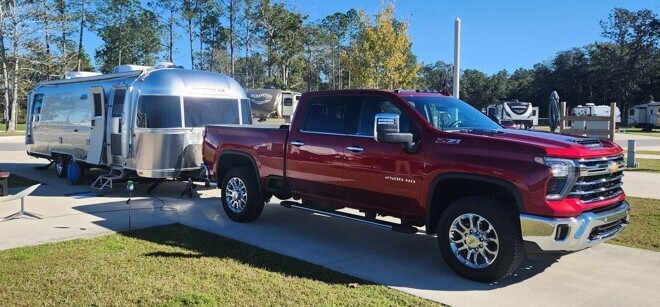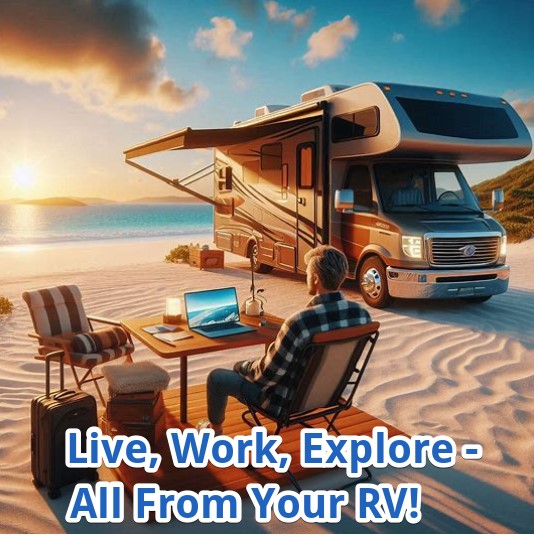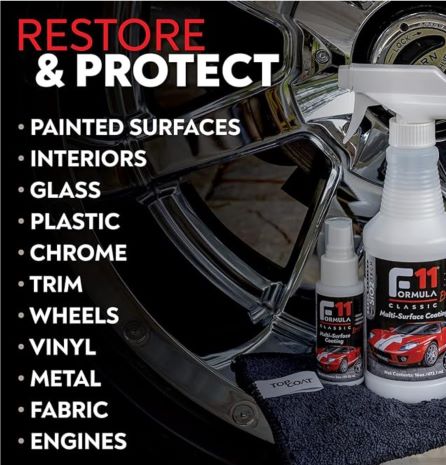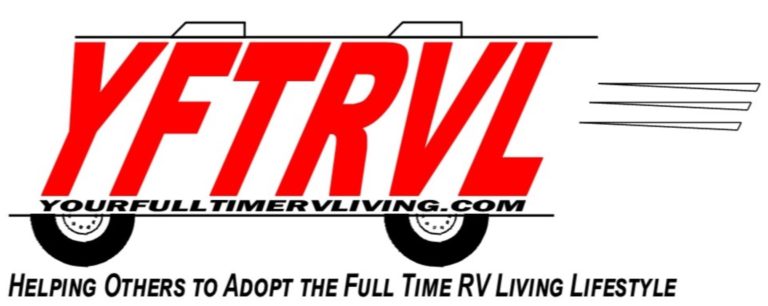For many, the RV lifestyle is a dream; one they enjoy part-time, traveling south to escape northern winters and heading back north when summer heat kicks in. These seasonal travelers are affectionately known as snowbirds.
But for some of us, part-time travel isn’t enough. We crave the freedom of the open road full-time.
Most folks who embrace this lifestyle are older, often retired, and eager to explore while they still can. Sadly, some only enjoy it for a few years before health challenges force them to settle down, their dream of full-time RV living cut short.
We have plenty of friends who think we’re crazy because we don’t want a house, a fixed address, or a garage full of stuff. Instead, we prefer life on the road, traveling wherever and whenever we choose. We love being nomadic!

Our Current Full Time RV Home
Is Full-Time RVing for Everyone?
Absolutely not! Full-time RV living isn’t for everyone, and that’s okay. But if it’s something you’ve ever dreamed about, our website is here to help you figure out how to make it happen.
We’ll share:
✅ How we do it
✅ What life on the road is really like
✅ Practical steps to ditch the traditional lifestyle and embrace freedom
Some might call us vagabonds, trailer trash, homeless, whatever! The truth is, we live a lifestyle many people only wish they could but don’t because they’re too stuck in their routines. Their mindset doesn’t allow them to think outside the box and create a life, not just a living.
Can Anyone Become a Full-Time RVer?
Yes! Of course, there are details to work out, but those are just logistics. If you’re serious about making the transition, we’ve got plenty of resources to help.
Why Wait?
What if you don’t want to wait until retirement to hit the road? Good news, you don’t have to! There are several ways to embrace full-time RVing right now, even if you still need to earn an income.
If you’re ready to say goodbye to:
❌ The big house
❌ Endless possessions
❌ Yardwork
❌ Snow shoveling
❌ Weekend trips to Home Depot
Then, let’s talk about how you can make it happen sooner rather than later.
Work Camping: A Way to Travel and Earn
One of the most popular ways to support an RV lifestyle is work camping: trading part-time work for an RV site at a campground or RV park.
Typical duties include:
? Office work
? Maintenance & Landscaping
? Cooking & retail sales
? Helping with whatever the campground owner needs
In exchange, you’ll get a full hookup site and sometimes even extra pay for additional hours. Some places only require part-time work, while others might ask for 40+ hours per week, especially in peak season.
Looking for a higher paycheck? Companies like Amazon hire seasonal workers for their CamperForce program, offering good wages, a paid campsite, and as many hours as you want during the busy holiday season.
Or, consider sugar beet harvesting—a short-term job where you can earn thousands in just a few weeks of intense work. We’ve had friends do it and love it so much that they go back every year!
Earn a Living Online from Your RV
Another way to start RVing before retirement is by working remotely. If you can:
? Teach online
? Write content about something you are passionate about, and maybe make money doing that
? Offer consulting services
? Work in customer service

A Rockin Grand Canyon Sunset
Then you can work from anywhere, even while parked near the Grand Canyon, watching the sunset over the South Rim! With reliable WiFi, the possibilities are endless.
Be Your Own Boss
The best option? Be self-employed.
Creating a business that allows you to work from anywhere gives you complete control over your time, location, and income. Companies are always looking for people to help them market their products online, and they’re willing to pay well for it.
If done right, this can be your ticket to RV freedom decades before you ever thought possible.
Why Not Start Today?
If full-time RV living has always been your dream, why wait? There are ways to make it happen sooner rather than later, you just have to take the first step.
Please read more content on our website for more tips on getting into the full time RV lifestyle.
Have questions? Drop us a comment. We’d love to hear from you!
Thanks for stopping by, and happy travels!
Blessings,
Howard & Pam









28 comments
Skip to comment form
Is it possible to be a nomadic RV’er and work from the road as a NRVIA Inspector? If it is possible, logistically how would that work? Very interested in pursuing this possible career path.
Author
Hi Timothy!
Thanks for stopping by our website!!
What sort of income do you need to create on a monthly basis to support yourself and how much traveling do you plan to do? Are you going to be in a location for just a few days and move on or are you staying in various locations for longer periods than that? What areas of the country are you going to be traveling to?
If you can give me an idea of what you think your full time RV lifestyle will be like I will better be able to answer that question. That being said, we have lots of NRVIA inspectors who are full-timers. How it will work depends on your needs and wants.
I’m 54 and work as a lumber associate at Home Depot in College Place Washington; I have talked to a couple that were full time RV living, wish we would have had time to talk but that’s part of having the monthly bills that are due I had to assist other customers. I would really love to quit Home Depot and become a full time RV person I dont know how to start when its paycheck to paycheck now.I would love a 101 RV LIVING GOR DUMMIES (which would be me). I have a 2001 Starcraft 1706 pop up. Any good starter ideas/options of getting started would be GREATLY APPRECIATED…I need a break from the day to day rat race.
Author
Hi Rex!
Sorry to hear that your work situation does not fulfill your desires.
The full time RV lifestyle is awesome but it is not a way to avoid living paycheck to paycheck. In fact, living in an RV can be more expensive than a cheaper apartment rental.
Certainly, unless you have some really desirable skills or you are able to run a business on the road, work camping will never pay as well as a W2 type job.
We appreciate your frustrations but jumping into our lifestyle takes careful planning and money in reserves. There is no one resource that totally prepares one for doing what we do. We have a lot of information on our site, but everyone’s situation is different.
Proceed with caution and we wish you the best in whatever direction you choose to go!
Hi Pam and Howard,
I noticed mostly men seem to be interested in becoming NRVIA certified inspectors. I was wondering how many women (if any) have showed an interest in this line of work. I am interested in doing something like this. I will want to earn a living while full time Rving.
I am at the beginning of my research and hope to be full time in the next 3 years or so. I have never driven a RV and it has been years since I have pulled a horse trailer or boat. I am in my late 50s, very fit and active. I will be traveling for the most part by myself.
I am also interested in how long can a diesel pusher sit while I am working and living out of it? I would probably be in one spot between 1 to 4 months depending on work. I like the idea of the long life with high mileage and low maintenance the diesels have to offer. But just getting ideas of which is my best choice, I want easy driving and low mainteance when possible. I know things will happen but want to try to keep probabilities of that
occurring to a low.
Thank you for your wonderful site, it has been a great resource to draw from as I start planning for me future home on the road!
Deb
Author
Hi Deb!
Thanks for stopping by our website! Let’s see if I can answer a few of your questions.
As far as RV inspectors, we have female inspectors in the NRVIA ranks. We are starting to have more as certified level two inspectors because certain RV buyers would rather deal with a woman than they would a man. If you would like to know more about becoming an RV inspector you can visit rvinspector.org and reach out to me again for further information.
As far as a diesel coach over a gas one, that is personal preference. They do better if they are driven as opposed to sitting (again, my opinion). You get a lot more bang for the buck in a class A gas coach. We were just looking at the new Tiffin coaches. We noticed you pay $100k more for a diesel chassis compared to the same coach that is built on the Ford chassis. And, the diesel version had fewer features than the comparable gas coach. As far as maintenance, I don’t consider maintenance cheaper on a diesel coach (again, my opinion based on ownership experience).
Thanks again for visiting and we are glad you found our website useful as you search for info about the full time RV lifestyle. If you have the time in October, and really want to know more about the possibilities of running a business and maybe workamping while traveling, come to the Workamper Rendezvous in Heber Springs, AR in mid-October. You can learn more at workamperevent.com.
Greetings,
We will be retiring after 32 years of military life and going full time. Wife is a nurse and will be starting a traveling nurse job. I would like to work camp and just follow her career now. We have researched the Forest River Riverstone and the Augusta Luxe. Do you have any recommendations for a full time fifth wheel?
Thank you for you assistance.
Author
Hi Cliff!
Thanks for stopping by our website!
What is your budget for your RV purchase? Are you buying new or used? Have you had a 5th wheel before? Can you make it to the Workamper News Rendezvous in October? This would be right up your alley given your future plans. A lot of your questions could be answered there.
My husband, Greg and I, are just starting this journey. We’ve been looking at floor plans that we think could work for us, as we will be living in it full time and not moving much (at first anyway). We have friends on a farm that want us to park it there. Lucky!
I liked the Catalina Legacy Edition 333RETS but can’t find any near me to look at Tampa Bay FL area. Also, I’d like a ball park figure on someone to move it about 500 miles. Our old truck probably wouldn’t be happy about hauling it. After awhile we’ll probably downsize again. We are taking this downsizing thing slowly! A lot to let go of – but we’ll be selling a lot of unnecessary junk in the next few months- and glad to do it!
Any helpful advise will be welcome. I love your website with all the great tips.
Thank you!
Lyn
Author
Hi Lyn!
Thanks for stopping by our website!
Greg visited us too back a few weeks ago and I left a response for him on my RV information for beginners page.
This is what I stated there:
Greetings Greg!
As far as your RV search, have you tried sources like rvtrader.com and rvt.com? You can enter that make and model into those search engines and see what comes up, perhaps something closer to you.
As far as having a transport company move the RV for you, have you searched “RV transport companies” on Google? You can add a local city to that and find what you are looking for.
Thank you again and we are glad our resources helped you out in some small way!!
Hi Howard. I am thinking about taking the 5 day hands on course in November to become a level one inspector. Exactly what kind of inspections can I do with this first phase before becoming a level two inspector?
Author
Hi, David!
Thanks for visiting our website!
A Leve One NRVIA certified RV Inspector can make $100 – $200 per engagement. These opportunities mostly come from warranty companies at this point. They take from 2 to 3 hours to complete.
A Level Two NRVIA certified RV Inspector can make $300 to $1,000 per engagement, perhaps more. These are for client orders that take 3 to 8 hours to accomplish.
We look forward to seeing you in Caldwell, TX. Please reach out to me if I can be of further assistance!
Hello Howard and Pam. I’m wondering if my 5th wheel levelers will collapse if I take out my battery to replace it? Sorry to bother you with the question? Appreciate your time in helping us RVers.
Regards,
Marshall
Author
Hi, Marshall!
No problem with asking! You should have no issues removing your batteries and having the levelers collapse. Without power, the motors are stable and don’t require 12-volt power to keep them that way.
Be sure to buy a good quality deep cycle battery to replace the one you are removing.
we bought a gas a. we are doing full time in 3 weeks. we have only taken it out once. I have been having last minute jitters but your wonderful article has put me back in can we go yet. THANK YOU
Author
Thanks for stopping by Carol and sharing with us! Glad to here that we helped!! Enjoy your full time RV living journey!!
Hi howard
I need to custom A 5 wheel 50 Ft what the best company in the market to do that ?
Thanks
Author
Hi, Kaly!
You can check with forksrv.com and spacecraftmfg.com. You may have to have a garage in the back to get that length due to RVIA certification standards. I hope you have a big truck!! LOL
We are just a few years from retirement – it’s flexible… We are trying to figure out if we should buy a home in beautiful northern Michigan, where “warm” weather could be just a few months, or have a home in the south. I’m concerned about having a home in the south and then leaving it empty during the summer. I envision either bad mold or high bills to run the air conditioning.
What are your thoughts?
Thanks,
Sheryl
Author
Hi Sheryl! Thanks for stopping by yourfulltimervliving.com!
Since our website deals with full time RV living and not houses, I really can’t share any thoughts in regards to your question. Our home is on wheels and we don’t have any experience with the issues you are considering.
Hello, thank you for having a great site full of information for us who are considering jumping into full time RV living. I recently retired from the U.S. Army after 27 years and longed to get back into agriculture. I found a non profit who assists farm families who have been injured, ill or suffered a natural disaster. We directly assist farm families by planting crops, harvesting crops or baling hay. Montana, North and South Dakota, Minnesota and Iowa are areas we serve now.
I live in stick home in Colorado and my wife and I are considering doing full time RV so that we can be close to the action in the upper midwest.
We have a lot to learn and have been stressing over picking the right 5th Wheel for seasonal weather conditions in that part of the world. Can anyone recommend a good all season RV? We plan on being in North Dakota from May through November and then back to Colorado for the winter.
Thanks y’all
Author
Hi Stephen!
Thanks for stopping by and sharing your vision for your full time RV living adventure! Sounds like a great cause to be a part of!
Be sure when you decide on a 5th wheel that it is rated for full time RV living. If you find one with heated tanks, storage bays, sealed underbelly, etc., you will have a much better experience with living in colder climates. Ice and snow can be damaging to an RV roof as things thaw and re-freeze.
Best of luck as you move forward!!
Howard,
What would you suggest for a first time RVer who is looking to be a fulltimer? 5th Wheel? Motorcoach? Also I like the idea of being an RV inspector. Can you share a bit more info on the cost of becoming one and where the education happens?
~~John Sanders
Author
Hi John!
Thanks for visiting yourfulltimervliving.com!
That is always a tough question when deciding what is going to work best for you when you may not have been out on the road yet. It’s hard to know what life will be like in either choice without actually having tried it.
Pam and I rented for years before we decided on a 5th wheel to start out. 50k miles of travel gave us a good idea of the lifestyle and what would work best based on our driving experiences and discussions with others already living the lifestyle.
Let’s face it, everyone has their own opinion on this. Some go 5th wheel because that is all they can really afford. From having lived in and traveled in both choices this is what I can narrow it all down to. If you are going to be traveling a lot then a motorized RV is so much easier. If you will be spending time work camping in areas for months on end then a 5th wheel works well.
Again, from having traveled and lived in both, we now prefer motorized as it is just plain easier: less setup/take down, less stress driving it, easier to get into and out of RV parks, etc.
The worst thing people do is buy a diesel pusher and let it sit for months while they live in it. Diesel engines need to be driven! Now the gas versions are pretty nice and can take sitting for extended periods of time, they just don’t always drive as well due to a chassis that is not as stout as the diesel counterpart.
I will drop you an email with more information on becoming an RV Inspector.
So, lots to consider based on how you are going to be using your full time RV home. Please feel free to drop me an email if I can be of further assistance!
Hi,
Just found your website and have been exploring it. My husband and I have been discussing this lifestyle for a while now. The major drawback of going now before retirement is the cost of health insurance. How do others do it? I haven’t seen much written about this aspect of the lifestyle. Thanks for any advise/thoughts. I’m sure we’ll have more questions before we take off…
Author
Hi Pam!
Yes, healthcare is a big issue! Now with forced health coverage it can be either a good thing, or a bad one. If you don’t make much you can get subsidies making your basic healthcare a couple of hundred dollars a month. The more you make the more you will pay. Since most full timers are older they are into the medicare system, etc. If you are younger like ourselves than it is more expensive. However, we don’t have all those other costs that sticks and bricks folks have.
Glad you found us! Keep researching the lifestyle! It is great, but not for everyone. There are lots of things to consider when choosing to live in 200-400 square feet!
Wow, I adore the idea of this free roaming life style. The first thing that come into my mind is less house chores cleaning. The conventional home occupies to many spaces and rubbish. It’s a headache to even start cleaning. I like my future home to be just a tiny shed with basic necessities and a view facing the ocean. Ah ~ beautiful.
Author
Cathy, I hope your future home becomes just that! A tiny shed on wheels is called an RV! You can place it near any beach you want.